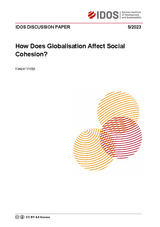How does globalisation affect social cohesion?
Vrolijk, KasperDiscussion Paper (5/2023)
Bonn: German Institute of Development and Sustainability (IDOS)
ISBN: 978-3-96021-206-5
DOI: https://doi.org/10.23661/idp5.2023
Price: 6 €
This paper explores the effects of globalisation on social cohesion outcomes and the underlying mechanisms. A framework for reviewing the literature is offered, in which labour earnings, household expenditures and firm productivity are identified as the main channels through which economic globalisation affects cohesion, trust and pro-social behaviour. Evidence points towards substantial losses in cohesion following negative globalisation changes, altering cohesion through absolute and relative changes in employment and expenditure (and people’s perception thereof). However, evidence is thin and inconsistent; studies are limited to effects of trade (and not foreign direct investment), cover some dimensions of cohesion but not others, and often evaluate the effect of negative trade events on cohesion (while trade and foreign direct investment may offer gains to workers, households and firms, which boosts cohesion). From the available evidence, it is determined that when setting policy, it is important to address relative losses from globalisation (between groups), incorporate economic costs of social repercussions, and take on market distortions and underlying cyclical or secular trends that may amplify the effects of globalisation on cohesion.


